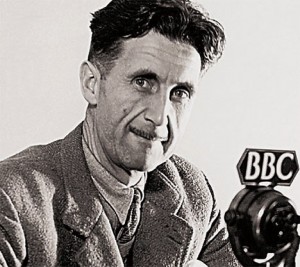In all departments of a modern business the effective use of language is a potent tool for achieving your goals. We often cite George Orwell’s rules on language as an effective way of them avoiding impenetrable management talk. In his essay Politics and the English Language (originally published in 1946). Why would we do that? Orwell wrote1:
- Never use a metaphor, simile or other figure of speech which you are used to seeing in print .
- Never use a long word where a short one will do.
- If it is possible to cut out a word, always cut it out.
- Never use the passive where you can use the active.
- Never use a foreign phrase, a scientific word or a jargon word if you can think of an everyday English equivalent.
- Break any of these rules sooner than say anything outright barbarous.
All well and good. But recently Will Self, also a novelist, made the bold claim2 that Orwell was “plain wrong.” Self argued that the variety in − and flexibility of − English offers users an enormous range of ways to express a huge number of ideas; he suggested that we shouldn’t limit this capacity by sticking rigidly to Orwell’s misguided mantra.
George Orwell at the BBC in 1946 Will Self, sometimes now at the BBC
So where does this debate leave GPB’s advice on avoiding business jargon? Well, let’s look at an example: Cognizant is a business and technology consulting firm. The text below is on their website:
“The future belongs to those that challenge the present. Who continually drive to be more efficient and productive in the face of electrifying change. And tirelessly invest in innovation and transform their organisation to lead change. The future belongs to enterprises who keep challenging their business model and growth targets, and who relentlessly game-change.”3
Self suggests that: “There are more ways of saying more things in English than ever”4.
Yet, rather than demonstrate this, the above passage shows us many ways of saying exactly the same thing which can be summed up simply: “Be the best – always lead change”. The repetition is laborious. Adverbs such as “Continually”, “tirelessly”, “relentlessly”, and even “keep (on)”, do not add value by their excessive number. We are bombarded with the notion that we should do things differently: “Change”, “innovation”, “transform”, change” (again), “game-change” point to this again and again, but the terms become increasingly annoying as they persist.
Even the attempted hendiadys (a Rhetorical Tool): “more efficient and productive” is tautological, for if something is efficient it is by definition productive. A cooker that does not produce heat, for instance, is inefficient; a striker who does not produce goals is inefficient. Even the OED definition of “efficient” begins with the words “Working productively…”.
Being “more efficient” necessarily entails being “more productive” – you don’t need to waste readers’ time by saying it twice. The Cognizant quote neither adheres to Orwell’s rules nor to Self’s beliefs. In consequence, their potential client learns nothing about what the company does or how it adds value. ‘Efficient’ is exactly what we recommend you aim for in your use of language: it should achieve maximum productivity with the minimum margin for misunderstanding or confusion. There are many abstract ideas in business so your language must convey your ideas as precisely as possible. Whether you are a CEO leading a company or a sales and marketing executive targeting clients directly, precision in your language avoids confusion and, accordingly, will save time.
But striving for precision doesn’t mean being terse. Ideally, language should be effective in its brevity, but it must achieve this without sacrificing its precision. Sometimes you may need to add words − or use a longer one − to offer clarity. Once, in a previous job, I received an email out of the blue from a line manager saying, “Please pick up the client’s files.” Concise? Yes. Clear? No. Which client? From where? To where? By when?
Try to ensure that you have the necessary details − sometimes you do have to elaborate on a pithy statement or request.Reading Orwell carefully you see that he doesn’t necessarily discourage you from longer vocabulary and syntax. He says, “Never use a long word where a short one will do” and “If it is possible to cut out a word, always cut it out”. These italics (mine) show that he was quite aware that there are instances when longer words are needed and judicious editing is unwanted.
Elaboration for precision may add huge value at times. If, in a business pitch, you make a particular claim about the service your company provides you should add a specific example to ensure clients understands exactly the benefits of what you are offering. E.g. If your fund management philosophy is highly complex, then you may find adding an analogy or simile (also Rhetorical Tools) will make it easier to understand the advantages of your methods.
Language is a powerful tool, so its effect should not be underestimated. Rudyard Kipling called words, “the most powerful drug used by mankind.” Acclaimed cognitive scientist Steven Pinker, who was recently interviewed in London’s City AM newspaper on how to banish business jargon, states6: “Good writing can flip the way the world is perceived”. Wouldn’t “flipping the way the world is perceived“ be a fantastic ability to have, be it at a sales meeting or in a speech? Much of our work is spent helping clients avoid abstract management speak, by adding simplicity and directness. Saying what is necessary in the most effective way often involves stripping away words.
Yet, the golden rule is say what you mean as appropriate to your audience. Use language to express rather than to impress. If you use a phrase like “I want to expatiate on…” rather than “Let me elaborate on…”, you must have a good reason for using it, and you must have a good idea of the effect it will have on your audience. If you don’t know exactly what a word means, you should not use it – even if everyone else does. Finally, you work hard, so your words should too; therefore, keep in mind one more essential motto: “Words, be effective!”
By Richard Keith
Sources:
1 Orwell, G, (2004) Why I Write, Penguin: London, p.119
2 & 4 http://www.bbc.co.uk/news/magazine-28971276
3 http://www.cognizant.com/dualmandate
5 Concise Oxford English Dictionary (11e), (2004), OUP: electronic version
6 Pinker, S, (2014), The Sense of Style: The Thinking Person’s Guide to Writing in the 21st Century, Penguin: London, p.14.



